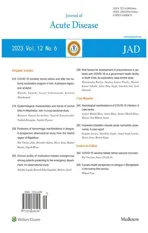COVID-19 vaccine-related retinal vascular occlusion
2023-04-21WaiYanLamSunnyChiLikAu
Wai Yan Lam, Sunny Chi Lik Au
1Department Ophthalmology, Grantham Hospital, Hong Kong, China; 2Department Ophthalmology, Tung Wah Eastern Hospital, Hong Kong, China
Retinal artery or vein occlusion (RAVO) is the ocular analog of cerebral stroke, and the iatrogenic causes, such as vaccines, were reported[1].The popularity of COVID-19 vaccines caused concerns about their potential association with RAVO[2,3].To investigate this potential association, we searched PubMed, MEDLINE, and EMBASE on March 28, 2023, with the following keywords:[“retinal artery occlusion” OR “retinal vein occlusion”] AND“COVID-19 vaccines”.
Narrative reviews were available on case reports and series.However, these publications have a major drawback of lacking control groups to prove a correlation.Excluding case reports and case series, we found only two original research studies[4,5].In the Germany multi-center case-control study, Feltgen et al.found no increased risk of RAVO after 1st dose of COVID-19 vaccines,no matter the overall RAVO or subgroup analysis[4].However, no boosters for COVID-19 vaccinations were included, and the types of vaccines were not specific (including both mRNA and viral vector vaccines).Therefore, caution should be paid to its interpretation.
Hashimoto et al.investigated 2nd booster doses of COVID-19 vaccines in their cohort, however, retinal artery occlusion was not studied[5].This Japanese cohort showed no increased risk of retinal vein occlusion (RVO) after 1st dose of COVID-19 vaccination, but an increased risk of RVO after 2nd dose.Despite a positive finding in the matched cohort part, their study found no increased risk in the self-controlled case series method, a method which is often used to investigate the association between vaccination and adverse events for time-invariant confounders.Hashimoto et al.pointed out that the discrepancy might be caused by the confounding factor of body mass index, which was a known risk factor for RVO, but not a studied data item in their cohort study[5].Given the uncertain conclusions presented above, further studies are needed to evaluate the correlation of either 1st or booster doses of COVID-19 vaccination with RAVO.
